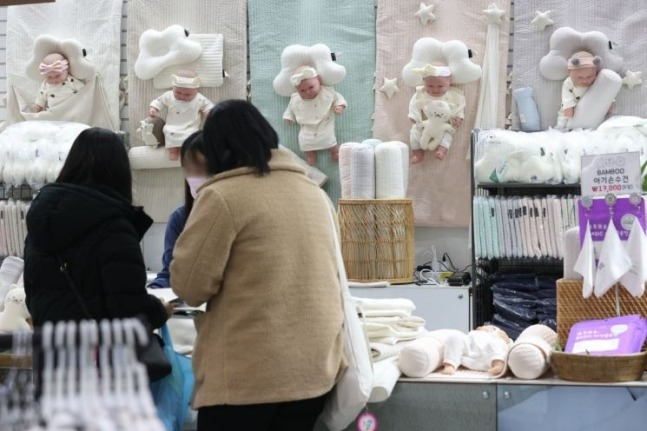Economy
S.KoreaŌĆÖs births fall to record low in February
The country sees 19,939 babies born in February 2023, falls below 20,000
By Apr 26, 2023 (Gmt+09:00)
1
Min read
Most Read
S.Korea's LS Materials set to boost earnings ahead of IPO process


Samsung shifts to emergency mode with 6-day work week for executives


NPS to commit $1.1 billion to external managers in 2024


HD Hyundai Marine IPO sees strong demand from retail investors


Navigating choppy waters: Dollar-won FX forecasting ┬Ā



South Korea's births fell to a fresh low in February in 2023. The number of deaths decreased, but the population continued to decline naturally for the 40th straight month.
According Statistics Korea on Wednesday, the number of births in February in 2023 decreased by 766 (-3.7%) from the previous year to 19,939. This is the lowest number since February 1981, when monthly statistics were first compiled. The previous record low was recorded in February 2022(27,050).
The monthly number of births has continued to decline year-on-year for 87 months since December 2015. The monthly record low was 16,803 in December 2022.
By city and province, the number of births decreased from the previous year in 12 major cities and provinces including Seoul and Busan, excluding five localities including Daegu and Incheon. The crude birth rate, which represents the number of births per 1,000 people, was 5.1. Sejong (9.4) had the highest crude birth rate and North Jeolla (4.0) had the lowest.
On the other hand, the number of deaths in February was 27,390, a decrease of 1,905 (-6.5%) from the same month last year. This is explained as a decrease in the number of deaths due to the decline in the aftermath of COVID-19. By locality, the number of deaths decreased in 15 cities and provinces nationwide except for Gangwon and North Jeolla.
With the number of deaths exceeding the number of births, the population decreased naturally by 7,452. Due to the effects of low birth rates and an aging population, the population has been declining naturally since November 2019, marking the 40th consecutive month. By city and province, except for Daejeon and Sejong, the population decreased naturally in the remaining 14 localities.
The number of marriages in February was 17,846, an increase of 2,541 (16.6%) from the same month in the previous year. This is due to the base effect of a sharp decrease in marriage registrations during the COVID-19 period. The number of marriages increased in all cities and provinces except for Sejong compared to the same period last year. The number of divorces during the same period also increased by 92 (1.3%) to 7,228.
Write to Sang-Yong Park at yourpencil@hankyung.com
More to Read
-
 EconomyS.KoreaŌĆÖs public spending on maternity, child care falls short of OECD average
EconomyS.KoreaŌĆÖs public spending on maternity, child care falls short of OECD averageApr 26, 2023 (Gmt+09:00)
1 Min read -
 Culture & TrendsHigh- and low-income S.Koreans alike reluctant to have babies: Survey
Culture & TrendsHigh- and low-income S.Koreans alike reluctant to have babies: SurveyApr 18, 2023 (Gmt+09:00)
3 Min read -

-
 EconomySouth Korea's total fertility rate falls under 0.8 in 3rd quarter
EconomySouth Korea's total fertility rate falls under 0.8 in 3rd quarterNov 23, 2022 (Gmt+09:00)
1 Min read -
 EconomyS.Korea forecast to have world's oldest population by 2070
EconomyS.Korea forecast to have world's oldest population by 2070Sep 06, 2022 (Gmt+09:00)
2 Min read -
 EconomyS.KoreaŌĆÖs birth rate decline accelerates to worldŌĆÖs lowest
EconomyS.KoreaŌĆÖs birth rate decline accelerates to worldŌĆÖs lowestFeb 25, 2021 (Gmt+09:00)
4 Min read
Comment 0
LOG IN


